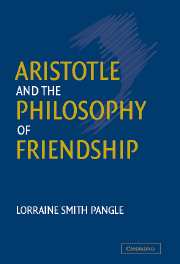Book contents
- Frontmatter
- Contents
- Acknowledgments
- Introduction
- 1 The Challenge of Plato's Lysis
- 2 The Three Kinds of Friendship
- 3 Aristotle and Montaigne on Friendship as the Greatest Good
- 4 Friendships in Politics and the Family
- 5 Cicero's Laelius: Political Friendship at Its Best
- 6 Quarrels, Conflicting Claims, and Dissolutions
- 7 Friends as Other Selves
- 8 Goodwill, Concord, and the Love of Benefactors
- 9 Self-Love and Noble Sacrifice
- 10 Friendship in the Happy Life
- Notes
- Bibliography of Modern Works and Editions
- Index of Names
3 - Aristotle and Montaigne on Friendship as the Greatest Good
Published online by Cambridge University Press: 04 July 2009
- Frontmatter
- Contents
- Acknowledgments
- Introduction
- 1 The Challenge of Plato's Lysis
- 2 The Three Kinds of Friendship
- 3 Aristotle and Montaigne on Friendship as the Greatest Good
- 4 Friendships in Politics and the Family
- 5 Cicero's Laelius: Political Friendship at Its Best
- 6 Quarrels, Conflicting Claims, and Dissolutions
- 7 Friends as Other Selves
- 8 Goodwill, Concord, and the Love of Benefactors
- 9 Self-Love and Noble Sacrifice
- 10 Friendship in the Happy Life
- Notes
- Bibliography of Modern Works and Editions
- Index of Names
Summary
Aristotle's discussion of the different types of friendship has so far been confined to friendships between equals, and his analysis has shown many reasons why equality is important in friendship. To the extent that the friendship turns upon utility, it is of course essential that the friends have something of more or less equal value to offer. To the extent that it turns upon pleasure, they must have similar capacities to please, and since the greatest pleasure in friendship is the pleasure of companionship and shared activity with a kindred spirit who has similar aims and feelings and desires, equality and similarity contribute enormously to the pleasantness of friendships. And Aristotle has stressed repeatedly that the perfect friendship of virtue will be a friendship of equals, each fully worthy of the other's confidence, trust, and generous support.
In 8.7, Aristotle turns to friendships between unequals, such as father and son, elder and youth, husband and wife, or ruler and subject. Not only do these unequal friendships differ as a class from those discussed previously, but each of them also has its own peculiar character and problems, and indeed each contains within it, as it were, two different friendships. For Aristotle says the superior and inferior have different virtues and functions and different grounds for their affection (1158b17–19). Thus, he explains, the partners do not receive the same thing from each other and should not expect to receive it.
- Type
- Chapter
- Information
- Aristotle and the Philosophy of Friendship , pp. 57 - 78Publisher: Cambridge University PressPrint publication year: 2002

